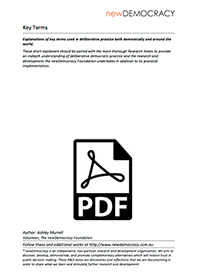‘How can we enhance our capacity to talk and think more deeply together about the critical issues facing our communities, our organisations, our nations, and our planet?’
The World Café: Shaping our Futures Through Conversations that Matter, Juanita Brown, 2005
What is the World Café?
The World Café method is a discussion group aimed at involving individuals with a problem/ issue more closely to collect insight and foster constructive dialogue, and can sometimes be used as a decision-making aid. It has been utilised by community organisations, government and corporations.
This method can involve any number of participants—from tens to hundreds.Participants will be engaged in a series of curated exercises by co-ordinators, designed to encourage participation in the discussion of new ideas.
Generally speaking the World Café will be comprised of groups of around 4 or 5 people per table, which may even be set up to resemble café tables with checked tablecloths, flowers and nibbles. Participants rotate tables in 10-30 minute rounds of discussion. The participants scatter after each round—all going to different tables, with a new group formed every time. Each round is facilitated by a table host who remains and, therefore, maintains the table’s memory of previous discussions. Previous input is shared with the new group. There is no limit to the number of rounds. The purpose is to touch on different aspects of the problem/issue, to deepen discussion/understanding and generate ideas, sometimes in order to establish the extent of common ground.
Traditional responses and the case for World Cafés
An example of a World Café in Australia occurred during the 2009 Citizens’ Parliament, which involved 150 randomly-selected citizens over four days discussing Australian democratic systems and how they would like to see them improved [LINK ACP on website]. The results from this included a non-binding list of 51 actionable proposals aimed around increasing freedom, inclusiveness and transparency. Another example, was the World Café at the Sydney Festival in 2010, with ‘happiness’ as the topic.
In addition, many of the world’s largest corporations such as Apple and Intel have used the method to draw suggestions from employees not normally involved in the decision process (World Café, 2017).
Benefits and Critiques
One of the key benefits of the approach is that it empowers those who do not normally have a say in the decision-making process. World Café requires active participation and encourages self-confidence, unlike some other problem solving methods which may ‘unconsciously develop states of learned helplessness’ in participants (Boyd & Bright, 2007).
Other positive outcomes that have been associated with World Café events have been: shifts in political activism as well as becoming more informed (Carson, 2011); and providing a melting pot of ideas for those who have power to gain awareness of the needs of those without. In this way the participants come to a joint understanding of the institutional barriers to change and can work together to come up with realistic alternatives and solutions.
One concern with the method may be the opportunity for the organising party to curate the discussion in such a way that the consensus reached may be biased toward a particular outcome. This may also be coupled with the fact that World Cafés can ‘conceal structural inequalities’ and can carry false notions of empowerment (Aldred, 2009). To avoid this, conveners need to make sure their purpose is clearly defined, communicated to participants, and is potent enough to actually affect social change.
What important questions remain?
The main challenges for World Café revolve around how they can be used for public benefit in modern democracies. For benefits to be achieved there needs to be a pathway for recommendations made to become institutionally recognised. For use in Australia, a clear framework must exist to establish relationships between participants, organisers and the community or governmental bodies who can use the input to improve themselves and the society in which they operate.
Further Information
http://www.theworldcafe.com/ – Official website of the World Café Foundation
https://www.participedia.net/en – Research and further reading
http://www.publicdeliberation.net – Research articles and discussion of methods around deliberative democracy
References
Aldred, R. (2009) ‘From Community Participation to Organizational Therapy? World Café and Appreciative Inquiry as Research Methods.’ Oxford University Press and Community Development Journal, 46 (1): 57-71
Boyd, N. M. and D. S. Bright. (2007) Appreciative inquiry as a mode of action research for community psychology, Journal of Community Psychology, 35(8) , pp. 1019 – 1036
Brown, J. (2005) The World Café, ́: Shaping Our Futures Through Conversations that Matter, Berrett-Koehler Publishers, San Francisco, CA. pp.3
Carson, L. (2011) ‘Designing a public conversation using the world café method’ Social Alternatives, 30(1), pp.10-14
The World Cafe. 2017. Global Impact. [ONLINE] Available at: http://www.theworldcafe.com/global-impact/. [Accessed 29 April 2017].
Author: Ashley Murrell
Volunteer, The newDemocracy Foundation
* newDemocracy is an independent, non-partisan research and development organisation. We aim to discover, develop, demonstrate, and promote complementary alternatives which will restore trust in public decision making. These R&D notes are discoveries and reflections that we are documenting in order to share what we learn and stimulate further research and development.

